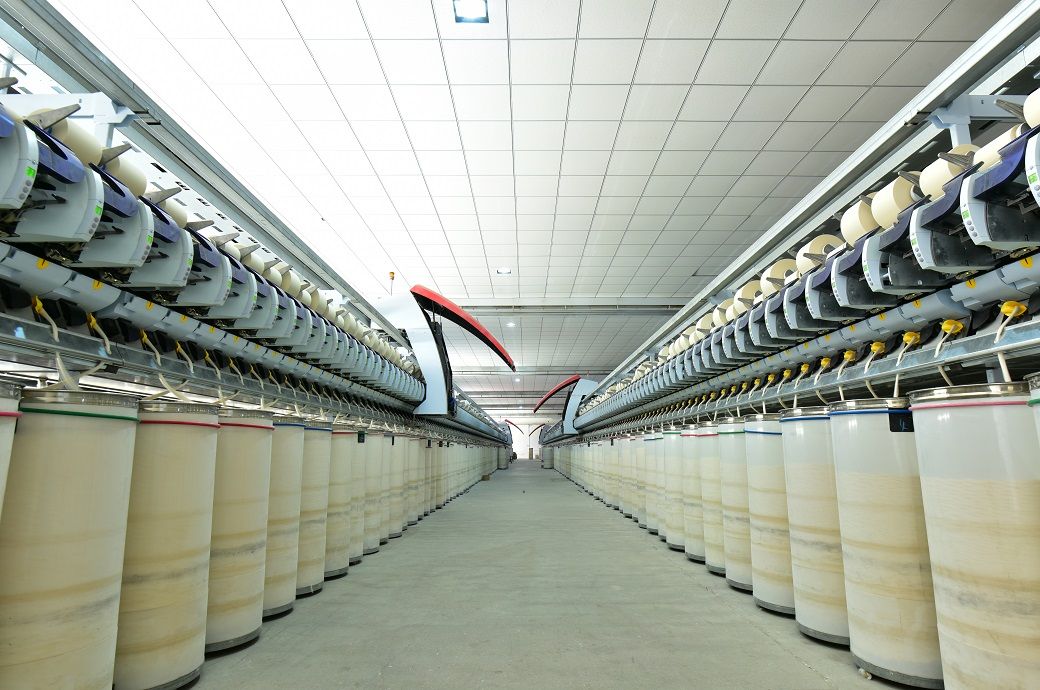
The Delhi market experienced stability in cotton yarn prices amid weak demand. Last week, the market saw a price increase following a rise in cotton prices. A trader from Delhi told Fibre2Fashion, "Bangladesh is a very important buyer of Indian fabric, but suppliers are hesitant to send new consignments. They are concerned about payment security after delivering fabric and other textile products."
In Delhi, 30 count combed knitting yarn was traded at ₹267-270 (approximately $3.18-3.22) per kg (GST extra), 40 count combed at ₹289-297 (approximately $3.44-3.54) per kg, 30 count carded at ₹244-246 (approximately $2.91-2.93) per kg, and 40 count carded at ₹269-272 (approximately $3.20-3.24) per kg today.
In Ludhiana, cotton yarn prices also remained steady due to halted exports to Bangladesh. Domestic demand for garments remains limited, discouraging buyers from purchasing cotton yarn. A Ludhiana trader highlighted that, alongside domestic demand, the larger issue is the disruption in the Bangladesh textile value chain, with concerns that over 300 units may relocate, reducing the demand for Indian fabric.
In Ludhiana, 30 count cotton combed yarn was sold at ₹260-270 (approximately $3.10-3.22) per kg (inclusive of GST); 20 and 25 count combed yarn were traded at ₹250-260 (approximately $2.98-3.10) per kg and ₹255-265 (approximately $3.04-3.16) per kg, respectively; and carded yarn of 30 count was noted at ₹240-245 (approximately $2.86-2.92) per kg today, according to trade sources.
Panipat's home textile market is seeing regular domestic demand, but slow export demand is causing concern. Indian suppliers of home textile raw materials are reluctant to export to Bangladesh. A Panipat trader noted that while domestic festival demand is stronger, export concerns to Bangladesh and other countries persist.
In Panipat, 10s recycled PC yarn (Grey) was traded at ₹78-82 (approximately $0.93-0.98) per kg (GST paid). Other varieties and counts were noted at 10s recycled PC yarn (Black) at ₹53-56 (approximately $0.63-0.67) per kg, 20s recycled PC yarn (Grey) at ₹96-102 (approximately 1.14-1.21) per kg and 30s recycled PC yarn (Grey) at ₹130-135 (approximately $1.55-1.61) per kg. Cotton comber prices were noted at ₹105-110 (approximately $1.25-1.31) per kg. Recycled polyester fibre (PET bottle fibre) noted at ₹71-75 (approximately $0.85-0.89) per kg today.
In north India, cotton traded steadily following a brief drop the previous day, with slow demand from spinning mills. Except for southern Rajasthan, where a slight decrease was noted, other markets saw prices hold at previous levels. Traders reported that mills are purchasing cotton based on immediate needs and are cautious about cotton quality. They also noted that the cotton crop is developing well, with no significant rain affecting northern India's cotton-growing states. The monsoon is expected to end in 8-10 days, and although cotton acreage has significantly declined in north India, favourable weather may boost both yield and quality.
Cotton arrivals were nearly zero in Haryana, Punjab, and Rajasthan, with only stocked cotton being traded between buyers and sellers. Cotton prices in Punjab ranged from ₹5,860 to ₹5,875 (approximately $69.77-69.95) per maund of 37.2 kg, while in Haryana, prices ranged from ₹5,775 to ₹5,780 (approximately $68.76-68.82). In upper Rajasthan, cotton was priced between ₹5,570 and ₹5,875 (approximately $66.32-69.95) per maund. Cotton from the Bikaner line sold for ₹5,875-5,975 (approximately $69.95-71.14) per maund, while in lower Rajasthan, cotton was priced at ₹55,800 to ₹58,800 (approximately $664.39-700.11) per candy of 356 kg.
ALCHEMPro News Desk (KUL)
Receive daily prices and market insights straight to your inbox. Subscribe to AlchemPro Weekly!